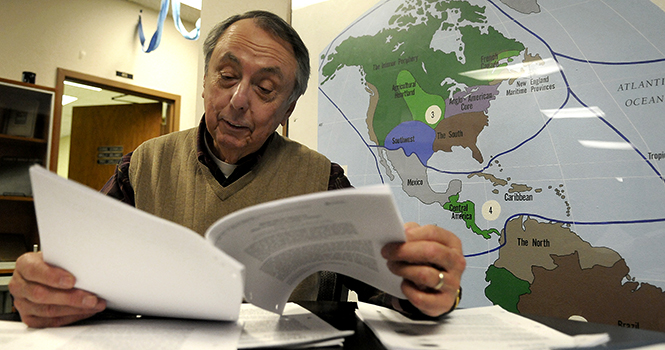Kent State home to thousands of nontraditional students
November 14, 2012
Don Mirolli, 76, is one of Kent State’s six students between ages 70 and 79.
Mirolli retired from MetLife insurance agency about 16 years ago, but he said retirement wasn’t for him. At the time, one of his biggest regrets was having not received a college education.
“All of my children are educated,” he said. “Most have master’s degrees. If you have a regret, you should do something about it.”
Mirolli signed up for his first courses at Kent State more than 10 years ago during the late 1990s. He’s not planning to get a job when he graduates; he’s not hoping for any kind of promotion. He’s taking classes because he wants to take classes.
Mirolli, senior geography major, is set to graduate with his bachelor’s degree in about a year. He is one of more than 8,000 nontraditional students enrolled at Kent State this semester.
The university defines nontraditional students as students who are older than 25 as first-time freshmen, students younger than 18, veterans and young parents.
“Adult and nontraditional students are just like any other Kent population,” said Rachel Anderson, director of the Center for Adult and Veteran Students. “But their roles are different and often their lives compete for attention.”
Though numbers are up from the last decade, enrollment for nontraditional students over age 25 decreased by 872 students this fall compared to fall 2011. Wayne Schneider, director of Research, Planning and Institutional Effectiveness, said that the decrease might be due to improving economic conditions.
“When things are bad, they come to school,” he wrote in an email. “When things improve, they stop.”
Another cause of the decrease could be Kent State’s lack of marketing toward nontraditional students, Anderson said. She said other universities offer more weekend courses and private classes for older students.
“Some colleges and universities really want adult students to [attend],” she said. “They market to adult students. Kent doesn’t do a lot of marketing or special programs for adults.”
High School Students at Kent State
- 13 – 14 years: 47 at regional campuses
- 15 years: 20 at main campus, 73 at regional campuses
- 16 years: 90 at main campus, 277 at regional campuses
- 17 years: 193 at main campus, 590 at regional campuses
- 18 years: 18 at main campus, 75 at regional campuses
Why come back to college?
25 to 34
1,920 at main campus, 3,408 at regional campuses
Brandi Garsteck, 25-year-old sophomore business major
“I got to the point where I needed a backup plan,” said Garsteck, who spent her early twenties working as a tour manager for bands All Time Low and We Are the In Crowd. “I don’t want to tour [with bands] for the rest of my life, and I had to get a degree.”
35 to 44
513 at main campus, 1,538 at regional campuses
Deanna Meadows, 42-year-old senior communication studies major
“I wasn’t happy with what I was doing,” said Meadows, who has worked in real-estate, waste-water treatment and excavating companies. “After about eight years of being fully self-employed, I realized what my niche was, and it was the communication [field].”
45 to 54
273 at main campus, 771 at regional campuses
Dorothea Stowers, 47-year-old junior public health major
“There were a lot of factors in making that [college] decision,” she said. “Without certain degrees behind your name, you kind of get lost in the system and find yourself in competition with younger people,” said Stowers, who enrolled at Kent State to earn a second bachelor’s degree in public health after receiving her first in nursing in 2000. “My children are adults, and it’s something I wanted to do.”
55 to 64
71 at main campus, 163 at regional campuses
Patricia Harmon, 58-year-old graduate student
“I’m too expensive and too experienced to teach high school,” said Harmon, who retired from teaching high school math in 2006. She wants to return to teaching and said her best option is at the university level, which means she needs a master’s degree. “School districts are hiring the best they can get for the money they offer, so experienced teachers are being passed out for people with less than three years experience, sometimes.”
65 and older
Carol Hixson, 79-year-old junior accounting major
“I’ve always enjoyed being around young people; I’m having a ball,” said Hixson, who graduated from Kent with an associate’s degree in business management in 1981. “I’m sorry now I didn’t go back sooner, but God has blessed me with good health and a good mind, and I thought, “Why not?”
Contact Megan Wilkinson at [email protected].

























